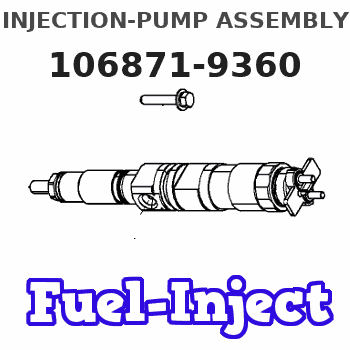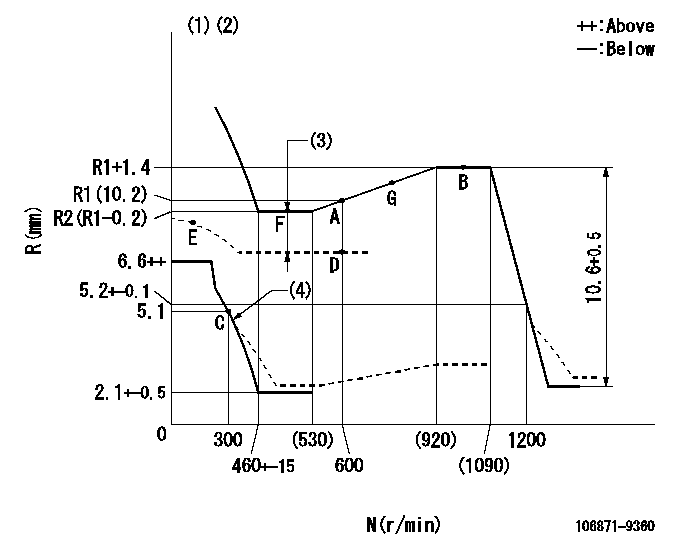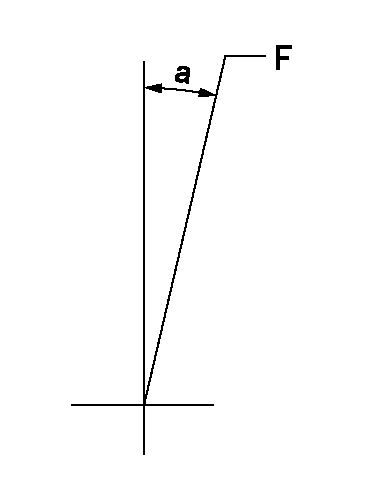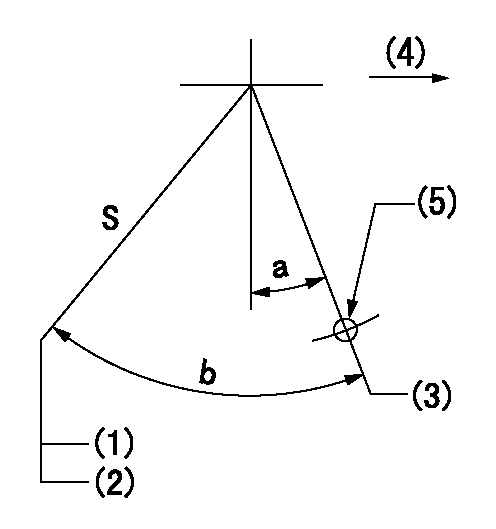Information injection-pump assembly
BOSCH
F 019 Z20 279
f019z20279
ZEXEL
106871-9360
1068719360

Rating:
Cross reference number
BOSCH
F 019 Z20 279
f019z20279
ZEXEL
106871-9360
1068719360
Zexel num
Bosch num
Firm num
Name
106871-9360
F 019 Z20 279
DPICO
INJECTION-PUMP ASSEMBLY
8DC9T2 Q
8DC9T2 Q
Calibration Data:
Adjustment conditions
Test oil
1404 Test oil ISO4113 or {SAEJ967d}
1404 Test oil ISO4113 or {SAEJ967d}
Test oil temperature
degC
40
40
45
Nozzle and nozzle holder
105780-8140
Bosch type code
EF8511/9A
Nozzle
105780-0000
Bosch type code
DN12SD12T
Nozzle holder
105780-2080
Bosch type code
EF8511/9
Opening pressure
MPa
17.2
Opening pressure
kgf/cm2
175
Injection pipe
Outer diameter - inner diameter - length (mm) mm 8-3-600
Outer diameter - inner diameter - length (mm) mm 8-3-600
Overflow valve
131424-4620
Overflow valve opening pressure
kPa
255
221
289
Overflow valve opening pressure
kgf/cm2
2.6
2.25
2.95
Tester oil delivery pressure
kPa
157
157
157
Tester oil delivery pressure
kgf/cm2
1.6
1.6
1.6
Direction of rotation (viewed from drive side)
Right R
Right R
Injection timing adjustment
Direction of rotation (viewed from drive side)
Right R
Right R
Injection order
1-2-7-3-
4-5-6-8
Pre-stroke
mm
3.4
3.35
3.45
Beginning of injection position
Governor side NO.1
Governor side NO.1
Difference between angles 1
Cyl.1-2 deg. 45 44.5 45.5
Cyl.1-2 deg. 45 44.5 45.5
Difference between angles 2
Cal 1-7 deg. 90 89.5 90.5
Cal 1-7 deg. 90 89.5 90.5
Difference between angles 3
Cal 1-3 deg. 135 134.5 135.5
Cal 1-3 deg. 135 134.5 135.5
Difference between angles 4
Cal 1-4 deg. 180 179.5 180.5
Cal 1-4 deg. 180 179.5 180.5
Difference between angles 5
Cal 1-5 deg. 225 224.5 225.5
Cal 1-5 deg. 225 224.5 225.5
Difference between angles 6
Cal 1-6 deg. 270 269.5 270.5
Cal 1-6 deg. 270 269.5 270.5
Difference between angles 7
Cal 1-8 deg. 315 314.5 315.5
Cal 1-8 deg. 315 314.5 315.5
Injection quantity adjustment
Adjusting point
-
Rack position
10.2
Pump speed
r/min
600
600
600
Each cylinder's injection qty
mm3/st.
141
136.8
145.2
Basic
*
Fixing the rack
*
Standard for adjustment of the maximum variation between cylinders
*
Injection quantity adjustment_02
Adjusting point
C
Rack position
5.1+-0.5
Pump speed
r/min
300
300
300
Each cylinder's injection qty
mm3/st.
14
11.9
16.1
Fixing the rack
*
Standard for adjustment of the maximum variation between cylinders
*
Injection quantity adjustment_03
Adjusting point
A
Rack position
R1(10.2)
Pump speed
r/min
600
600
600
Average injection quantity
mm3/st.
141
140
142
Basic
*
Fixing the lever
*
Boost pressure
kPa
36
36
Boost pressure
mmHg
270
270
Injection quantity adjustment_04
Adjusting point
B
Rack position
R1+1.4
Pump speed
r/min
1000
1000
1000
Average injection quantity
mm3/st.
166
162
170
Fixing the lever
*
Boost pressure
kPa
36
36
Boost pressure
mmHg
270
270
Injection quantity adjustment_05
Adjusting point
E
Rack position
-
Pump speed
r/min
100
100
100
Average injection quantity
mm3/st.
130
110
150
Fixing the lever
*
Boost pressure
kPa
0
0
0
Boost pressure
mmHg
0
0
0
Boost compensator adjustment
Pump speed
r/min
500
500
500
Rack position
R2-0.4
Boost pressure
kPa
16
14.7
17.3
Boost pressure
mmHg
120
110
130
Boost compensator adjustment_02
Pump speed
r/min
500
500
500
Rack position
R2(R1-0.
2)
Boost pressure
kPa
22.7
16
29.4
Boost pressure
mmHg
170
120
220
Timer adjustment
Pump speed
r/min
-
Advance angle
deg.
0
0
0
Remarks
Measure speed (beginning of operation).
Measure speed (beginning of operation).
Timer adjustment_02
Pump speed
r/min
-
Advance angle
deg.
4
3.5
4.5
Remarks
Measure the actual speed, stop
Measure the actual speed, stop
Test data Ex:
Governor adjustment

N:Pump speed
R:Rack position (mm)
(1)Tolerance for racks not indicated: +-0.05mm.
(2)Microswitch not operating at delivery.
(3)Boost compensator stroke: BCL
(4)Damper spring setting: DL
----------
BCL=0.4+-0.1mm DL=4.9-0.2mm
----------
----------
BCL=0.4+-0.1mm DL=4.9-0.2mm
----------
Speed control lever angle

F:Full speed
----------
----------
a=(16deg)+-5deg
----------
----------
a=(16deg)+-5deg
0000000901

F:Full load
I:Idle
(1)Stopper bolt setting
----------
----------
a=10deg+-5deg b=28deg+-3deg
----------
----------
a=10deg+-5deg b=28deg+-3deg
Stop lever angle

S:Stop the pump.
(1)Rack position = aa
(2)Stopper bolt setting
(3)Free (at delivery)
(4)Drive side
(5)Use the hole at R = bb
----------
aa=(3.5)-0.5mm bb=32mm
----------
a=10.5deg+-5deg b=(57.5deg)+7deg-5deg
----------
aa=(3.5)-0.5mm bb=32mm
----------
a=10.5deg+-5deg b=(57.5deg)+7deg-5deg
0000001501 GOVERNOR TORQUE CONTROL

Dr:Torque control stroke
(A): Without torque control spring capsule
1. Adjustment procedures
(1)Procedure is the same as that for the RFD (former type), except that the positive torque control stroke must be determined at the full lever setting.
2. Procedures for adjustment
(1)Remove the torque control spring capsule.
(2)Operate the pump at approximately N1. (End of idling spring operation < N1.)
(3)Tilt the lever to the full side.
(4)Set so that R = RF.
(5)Increase the speed by pushing in the screw (attached to the bracket on the rear of the tension lever) through the adjusting window.
(6)Adjust so that the torque control stroke Dr1 can be obtained.
(7)Align N2 and N3 with the torque control spring capsule.
3. Final confirmation
(1)After final confirmation, temporarily set the load lever to N = N1, R = idling position.
(2)From this condition, increase speed to N = N4.
(3)Confirm that positive torque control stroke is Dr2.
----------
N1=500r/min N2=(530)r/min N3=(920)r/min N4=1000r/min RF=R2(R1-0.2)mm Dr1=R1+1.4mm Dr2=0+0.3mm
----------
----------
N1=500r/min N2=(530)r/min N3=(920)r/min N4=1000r/min RF=R2(R1-0.2)mm Dr1=R1+1.4mm Dr2=0+0.3mm
----------
Timing setting

(1)Pump vertical direction
(2)Coupling's key groove position at No 1 cylinder's beginning of injection
(3)B.T.D.C.: aa
(4)-
----------
aa=14deg
----------
a=(40deg)
----------
aa=14deg
----------
a=(40deg)
Information:
Overheating
Possible Causes/Corrections
Low Coolant Level/If the coolant level is too low, not enough coolant will go through the engine and radiator. This lack of coolant will not take enough heat from the engine and there will not be enough flow of coolant through the radiator to release the heat into the cooling air. Low coolant level is caused by leaks or wrong filling of the radiator. With the engine cool, be sure that coolant can be seen at the low end of the fill neck on the radiator top tank. Bad Temperature Gauge/A temperature gauge which does not work correctly will not show the correct temperature. If the temperature gauge shows that the coolant temperature is too hot but other conditions are normal, either install a gauge you know is good or check the cooling system with the 8T470 Thermistor Thermometer Group. Dirty Radiator/Check the radiator for debris between the fins of the radiator core which prevents free air flow through the radiator core. Check the radiator for debris, dirt, or deposits on the inside of the radiator core which prevents free flow of coolant through the radiator. Loose Belt(s)/Loose fan or water pump belts will cause a reduction in air or water flow. Tighten the belts according to V-BELT TENSION CHART that is shown in Specification section of this Service Manual. Bad Hose(s)/Bad hoses with leaks can normally be seen. Hoses that have no visual leaks can "collapse" (pull together) during operation and cause a restriction in the flow of coolant. Hoses become soft and / or get cracks after a period of time. Hoses must be changed after 50,000 miles or a year of use. The inside can become loose, and the loose particles of the hose can cause a restriction in the flow of coolant. Shunt Line Restriction/A restriction of the shunt line from the radiator top tank to the engine front cover, or a shunt line not installed correctly, will cause a reduction in water pump efficiency. The result will be low coolant flow and overheating. Shutters Not Opening Correctly/Check the opening temperature of the shutters. The shutters must be completely closed at a temperature below the fully open temperature of the water temperature regulators. Also, verify that fan control switches or viscous fans are operating correctly. Bad Water Temperature Regulators/A regulator that does not open, or only opens part of the way, can cause above normal heating. To test the thermostats, see the Testing and Adjusting section of this Service Manual. Bad Water Pump/A water pump with a loose impeller does not pump enough coolant for correct engine cooling. A loose impeller can be found by removing the water pump, and by pushing the shaft back and pulling it forward. If the impeller has no damage, check the impeller clearance. The clearance between the impeller and the housing is 0.56 to 1.50 mm (.022 to .059 in.). Air in Cooling System/Air can get into the cooling system in different ways. The most common causes
Possible Causes/Corrections
Low Coolant Level/If the coolant level is too low, not enough coolant will go through the engine and radiator. This lack of coolant will not take enough heat from the engine and there will not be enough flow of coolant through the radiator to release the heat into the cooling air. Low coolant level is caused by leaks or wrong filling of the radiator. With the engine cool, be sure that coolant can be seen at the low end of the fill neck on the radiator top tank. Bad Temperature Gauge/A temperature gauge which does not work correctly will not show the correct temperature. If the temperature gauge shows that the coolant temperature is too hot but other conditions are normal, either install a gauge you know is good or check the cooling system with the 8T470 Thermistor Thermometer Group. Dirty Radiator/Check the radiator for debris between the fins of the radiator core which prevents free air flow through the radiator core. Check the radiator for debris, dirt, or deposits on the inside of the radiator core which prevents free flow of coolant through the radiator. Loose Belt(s)/Loose fan or water pump belts will cause a reduction in air or water flow. Tighten the belts according to V-BELT TENSION CHART that is shown in Specification section of this Service Manual. Bad Hose(s)/Bad hoses with leaks can normally be seen. Hoses that have no visual leaks can "collapse" (pull together) during operation and cause a restriction in the flow of coolant. Hoses become soft and / or get cracks after a period of time. Hoses must be changed after 50,000 miles or a year of use. The inside can become loose, and the loose particles of the hose can cause a restriction in the flow of coolant. Shunt Line Restriction/A restriction of the shunt line from the radiator top tank to the engine front cover, or a shunt line not installed correctly, will cause a reduction in water pump efficiency. The result will be low coolant flow and overheating. Shutters Not Opening Correctly/Check the opening temperature of the shutters. The shutters must be completely closed at a temperature below the fully open temperature of the water temperature regulators. Also, verify that fan control switches or viscous fans are operating correctly. Bad Water Temperature Regulators/A regulator that does not open, or only opens part of the way, can cause above normal heating. To test the thermostats, see the Testing and Adjusting section of this Service Manual. Bad Water Pump/A water pump with a loose impeller does not pump enough coolant for correct engine cooling. A loose impeller can be found by removing the water pump, and by pushing the shaft back and pulling it forward. If the impeller has no damage, check the impeller clearance. The clearance between the impeller and the housing is 0.56 to 1.50 mm (.022 to .059 in.). Air in Cooling System/Air can get into the cooling system in different ways. The most common causes
Have questions with 106871-9360?
Group cross 106871-9360 ZEXEL
Dpico
106871-9360
F 019 Z20 279
INJECTION-PUMP ASSEMBLY
8DC9T2
8DC9T2